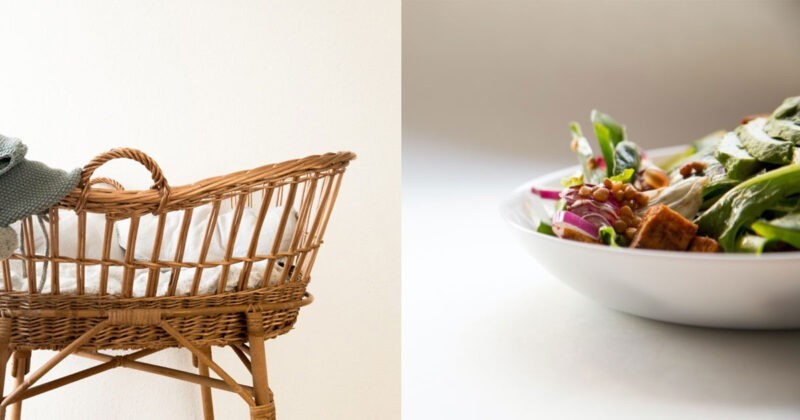
I wonder about confinement and confinement meals a lot these days. It’s not because of wilful curiosity, no. I am, in fact, with child for 16 weeks now and as my due date draws close, I can never seem to avoid this one lingering question from well-meaning observers: “Have you got your confinement settled?”.
Before being pregnant, I’ve never thought of confinement as a big issue. After all, with my husband working freelance and my parents staying together with me, taking care of the little one does not seem to be much of a concern.
However, as I’ve soon come to understand, confinement is not just about the care of the baby. Today, it revolves more around the mother’s recuperation and is thought of as a healing journey to bring mothers back to their prenatal conditions.
As Asians, the need for confinement meals seemed to be ingrained in us, evolving from a luxury good to a practical industry that never seems to catch up with demand.
But having done a ton of research on postpartum nutrition, I’m starting to have my doubts on the concept of confinement meals in itself. How much of the reasoning of having confinement meals is scientific, how much is superstition, and most importantly, is its price exclusivity deliberately exclusionary?
The Western condition

Google ‘studies on postpartum nutrition’ and instead of scientific research on the topic, you will get a slew of recommendations from doctors, dieticians, nutritionists, and very passionate mummies.
Admittedly, in the Western context, the terms ‘confinement’ and ‘confinement meals’ are not commonly heard of as many in those parts of the world, believe that women heal differently and nutrition requirements varies from person to person. There are, therefore, no specific guidelines for mothers to follow on what to eat and what to avoid. Their rule of thumb is simple: revolve what you eat around the food pyramid, have a balanced diet, rest well, and stay amply hydrated.
There is no need for the common Asian ingredient of ginger or garlic; neither is there a need to sip on cups of red date tea. Just eat as you usually do but with an extra focus and emphasis on nutrition. That’s it.
In this context, even without any external help or proper confinement meals, taking time to plan and prepare your meals will ensure your body gets the necessary nutrition to replenish postnatal depletion. By consuming healthy, home-cooked meals, fast recovery can also be expected without the need for extra expenditure.
The Eastern beliefs

On the other hand, here in the East, it is a common belief that a woman’s body becomes ‘cold’ after giving birth. A condition where it’s believed that wind enters the body leading to symptoms like acute pain, headaches, and chills. Due to the loss of blood and bodily fluids during birth, it is also essential for mothers to replenish their health with necessary nutrition.
As such, confinement food often revolves around Traditional Chinese Medicine (TCM) and focuses on balancing the body’s Yin and Yang. The menu aids in purging excess ‘wind’, promoting blood circulation, and also revitalising the mother’s energy.
With adequate care and confinement meals planned around ‘heat-inducing’ ingredients, mothers are believed to be able to get back in shape with a lower possibility of rheumatism, body pains, and migraines.
Indeed, this entire ideology of having confinement meals originated from Asian culture—practices passed down generations after another from our ancestors and thus, possesses little to no scientific basis.
Think of it like feng shui—the kind of centuries-old tradition that is archaic yet not easy to cast aside. And in this modern-day, humans often rely on such beliefs to put their mind at ease, with the conviction that their situation will get better with the help of sound advice, passed down from one mother to another, in an ad infinitum cycle.
The segregation

But, all that said, I like the concept of having either a confinement nanny or catered confinement meals. These, to me, are the kind of first-time help mothers would need. My only gripe: the price.
Depending on the type of meal provided, a month’s worth of catered lunch and dinner ranges from S$1,300 to S$2,000, working out to an average of S$30 for a single meal—a hefty price tag that not many Singaporeans can afford.
While no one sets out for the notion of confinement meals to be segregative, its prohibitive cost indeed has limited it’s access to a select demographic of mothers. Today, catered confinement meals are gaining popularity amongst nuclear families, more specifically, white-collar middle-class Singaporeans who have the extra budget to afford such services.
The segregation and exclusionism are mainly educational as well. Some of the best information for the most quality confinement meals is often found on parenting forums online and on social media. Here, it’s assumed that all expectant mothers have the luxury of time to peruse such avenues of knowledge as well as the know-how of where to look for the best confinement meal advice.
Pregnant women who live paycheck to paycheck can only dream of the luxury of time and resources to access such information.
Offline, new mothers can easily glean such information through social activities revolving motherhood. Here, I’m referring to antenatal classes, prenatal yoga, or post-natal massages, just to name a few. Mothers from the low-income community could hardly financially afford such luxuries or time for extra-curricular pre-birth activities and are often more concerned about when they can resume work to support this new addition to the family.
For lower-income families struggling to get food on the dining table, confinement meals are inconceivable luxuries that will only add to the burden of cost raising a child in Singapore. This further distincts the income inequality amongst households, drawing a clear, unmovable line between those who are privileged and those who are not.
The foregone conclusion

Whether it’s scientific or purely superstition, the concept of confinement meals in Singapore is undoubtedly here to stay and I agree that there is indeed a good reason for its existence. Whether it’s a meal catered by a knowledgeable home cook or prepared by a well-meaning elder, confinement meals are an excellent extension of a helping hand that all new mothers desperately need.
With the focus shifted to the new-born after birth and the mother’s health potentially left in the lurch, confinement meals ensure that mothers get the nutrients they need during a period where they too often neglect their well being. It not only takes the need for meal preparation off your shoulders, but it also gives mothers extra time to adapt to the whole new environment that they are thrown into.
Yet, I can’t help but to question the unintended consequence of its price prohibitiveness and what that means for a new mother with limited resources at hand. It begs the question of whether the price of confinement meals can be adjusted such that it can be within reach of every Singaporean mother who could use all the nutritional help they can get in their journey towards recovery.
Perhaps market forces would eventually compel providers to revise their prices so as to cater to a more inclusive demographic of mothers. But until that happens, the scorn towards confinement meal might be the uncomfortable silence us mothers have to live with—at least until courageous change comes along.






